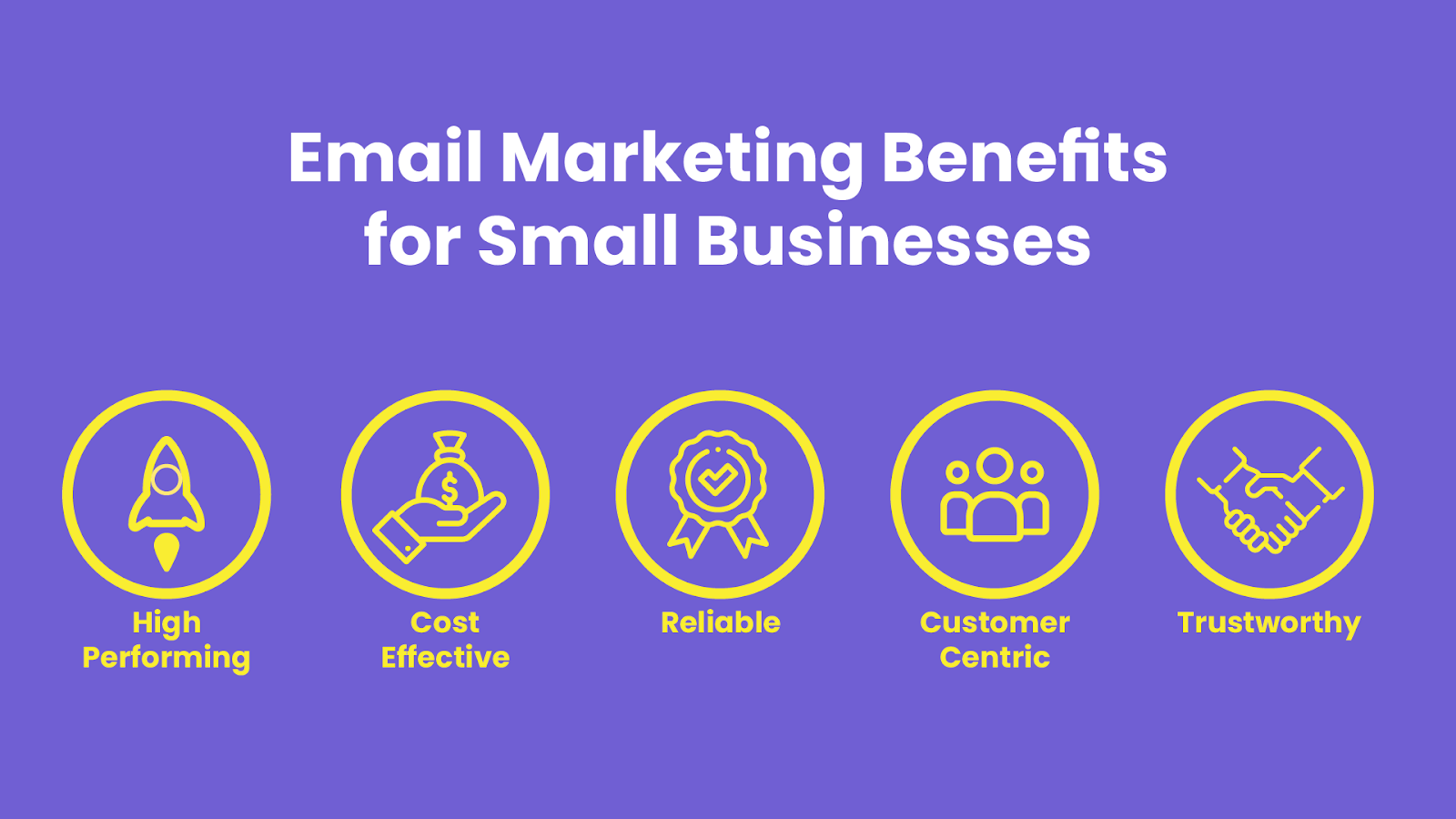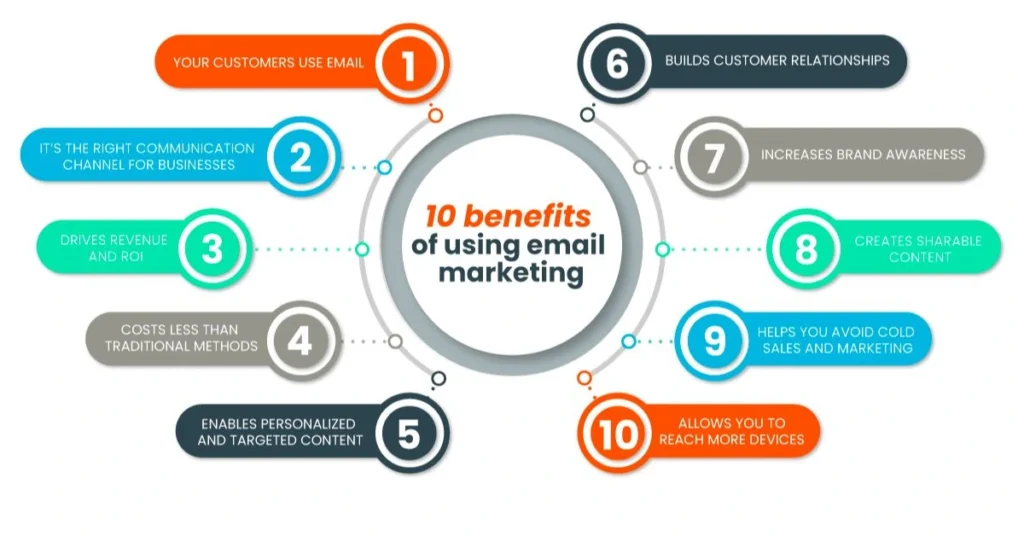Are you wondering if email marketing is the right move for your small business? You’re not alone.
Many business owners like you are trying to navigate the maze of digital marketing options. But here’s the thing: email marketing might just be your secret weapon. It’s not just about sending messages; it’s about building relationships and turning potential customers into loyal fans.
Imagine reaching your audience directly, right in their inbox, with messages that speak to their needs. Sounds powerful, doesn’t it? Keep reading to discover how email marketing can transform your business and why it’s a strategy you can’t afford to miss.

Credit: yandex.com
Benefits Of Email Marketing
Email marketing boosts small businesses by directly reaching customers, enhancing relationships, and increasing sales. It offers a cost-effective way to engage audiences, personalize content, and track results.
Email marketing is a powerful tool for small businesses, offering numerous advantages that can help you grow and succeed in a competitive market. It’s a dynamic approach that allows you to connect directly with your customers, boost your brand visibility, and drive sales, all while keeping costs in check.
Cost-effective Strategy
Email marketing is affordable compared to other marketing channels. You don’t need a huge budget to reach thousands of potential customers. Think about the money you save on printing and postage. Many email platforms offer free plans that provide essential features.
Some businesses have grown their customer base significantly, spending far less than traditional advertising methods. Isn’t it appealing to maximize your marketing efforts without breaking the bank?
Direct Communication Channel
Emails allow you to communicate directly with your customers. You can send personalized messages that make recipients feel valued. Unlike social media, where posts can get lost in the noise, emails land directly in inboxes.
Imagine sending a special offer to your loyal customers; they will likely feel appreciated. Direct communication builds stronger relationships and enhances customer loyalty. Are you making the most of this direct line to your audience?
Measurable Results
Email marketing provides clear insights into how your campaigns perform. You can track open rates, click-through rates, and conversions. This data lets you see what’s working and what needs improvement.
Consider how you can tweak your strategies based on feedback. With measurable results, you can refine your approach to achieve better outcomes. How else can you get such detailed information on your marketing efforts?
Email marketing is more than just sending messages; it’s about engaging effectively with your audience. By leveraging its benefits, you can enhance your small business’s growth and create lasting connections with your customers.
Building An Email List
Email marketing boosts customer engagement for small businesses. Building an email list helps reach potential buyers effectively. It’s a cost-effective way to maintain customer relationships.
Building an email list is like planting seeds for your small business growth. It’s not just about gathering email addresses; it’s about creating a community that trusts and values what you offer. Imagine having a direct line to potential customers who are genuinely interested in your products or services. This connection can become a powerful tool to nurture relationships and ultimately drive sales. But how do you start building this valuable list? Let’s break it down into simple steps.
Techniques For List Building
Start by leveraging what you already have. Your existing customer base is a goldmine for email list building. Reach out to them with exclusive offers or insider news to encourage them to subscribe.
Use social media platforms to promote your newsletter or email sign-up. Post engaging content that entices followers to join your email list for more.
Consider collaborations with other businesses. A shared promotion can introduce your brand to a new audience, increasing your subscriber count.
Opt-in Forms And Landing Pages
Opt-in forms are your frontline soldiers in the email list-building battle. Make them visible on your website, blog, and even social media pages.
Ensure these forms are simple and easy to fill out. Overcomplicated forms can deter potential subscribers.
Create dedicated landing pages that highlight the benefits of subscribing. Offer a free eBook, discount, or exclusive content to sweeten the deal.
Nurturing Subscriber Relationships
Your subscribers are not just email addresses; they are individuals with unique needs. Start by sending welcome emails that express gratitude and set expectations.
Regularly share valuable content that addresses their interests. Think tips, guides, or industry insights that align with your business.
Engage in two-way communication. Encourage feedback and questions, showing that you value their opinions and are eager to listen.
Are you ready to see your small business grow through email marketing? Building an email list is an investment in your future success, and with these techniques, you’re on the right path. How will you start nurturing your subscribers today?
Crafting Effective Emails
Small businesses can benefit greatly from email marketing. It helps reach a wider audience effectively. Crafting concise, engaging emails keeps customers interested and boosts brand visibility.
Crafting Effective Emails
Email marketing is an essential tool for small businesses. Crafting effective emails can be your ticket to increased engagement and sales. But how do you ensure your emails don’t just land in the inbox but are actually opened and read? Let’s dive into some actionable tips to make your emails stand out.
Subject Line Tips
The subject line is your first impression. It needs to be compelling enough to make your subscribers click. Keep it short, ideally under 50 characters.
Consider posing a question or adding a sense of urgency. For example, “Need a Last-Minute Gift?” or “Limited Time Offer: 20% Off.”
Avoid clickbait. Your subject line should reflect the content of your email honestly. Otherwise, you risk losing trust.
Personalization Techniques
People love feeling special. Addressing your subscriber by name can significantly increase open rates. It’s simple but effective.
Segment your email list based on preferences or past purchases. This allows you to tailor content specifically to different groups, making it more relevant.
Share personal stories or insights that relate to your audience’s interests. Have you ever tried a product that revolutionized your life? Tell them about it. It shows authenticity and builds connection.
Content Ideas For Engagement
Your email content should be concise yet engaging. Use bullet points for easy readability. People skim emails, and bullet points help highlight key information.
Include a call-to-action. What do you want your reader to do? Sign up for a webinar? Visit your store? Make it clear and compelling.
Offer exclusive deals or insider information. Everyone loves feeling like they’re part of something special. It’s a great way to keep your audience engaged and looking forward to your emails.
Email marketing can be a game changer for your small business. Are your emails making the impact you want? If not, try these strategies and watch your engagement soar.

Choosing The Right Email Marketing Tools
Small businesses can benefit from using email marketing tools to connect with customers. These tools help in sending regular updates and promotions, making communication easier. Choosing the right tools ensures effective marketing efforts, leading to better customer engagement and business growth.
Email marketing can be a game-changer for your small business, but choosing the right tools can feel overwhelming. You might wonder which platform offers the best features or fits your budget. With so many options available, how do you decide? Let’s break it down to make your decision easier and more informed.
Comparing Platforms
Start by comparing popular email marketing platforms. Look at user reviews and ratings for Mailchimp, Constant Contact, and SendinBlue, among others. Each platform offers unique advantages, so think about what aligns with your business goals.
Talk to fellow business owners about their experiences. They might share insights you hadn’t considered. Remember that what works for one business might not work for another, so tailor your choice to your specific needs.
Features To Consider
Focus on features that can enhance your email marketing strategy. Do you need automation to send personalized emails? Or maybe you want advanced analytics to understand your audience better.
Make a list of must-have features before exploring platforms. This will prevent you from getting swayed by unnecessary bells and whistles. Also, check if the platform integrates seamlessly with tools you already use, like your website or CRM.
Budget-friendly Options
As a small business owner, keeping costs in check is crucial. Some platforms offer free plans with limited features, like Mailchimp’s basic plan. Evaluate these options to see if they meet your needs without breaking the bank.
Consider starting with a free plan to test the waters. You can always upgrade as your business grows. Remember, the most expensive option isn’t always the best; it’s about finding a balance between cost and value.
Choosing the right email marketing tool doesn’t have to be daunting. By comparing platforms, considering essential features, and exploring budget-friendly options, you can find the perfect fit for your business. What email marketing tool will you choose to elevate your business?
Email Marketing Best Practices
Email marketing is a valuable tool for small businesses. Following best practices ensures effectiveness and compliance. It helps build trust and engagement with your audience. Here are key areas to focus on.
Maintaining Compliance
Legal compliance is crucial in email marketing. Familiarize yourself with laws like GDPR and CAN-SPAM. Always get consent before sending emails. Provide an easy way to unsubscribe. This builds trust and protects your business.
Frequency And Timing
Finding the right email frequency is important. Too many emails can annoy subscribers. Too few, and they might forget you. Test different schedules to see what works best. Consider your audience’s time zones for optimal timing.
Analyzing Performance Metrics
Monitoring performance metrics is essential. Track open rates and click-through rates. These metrics show how well your emails perform. Use this data to improve your strategy. Adjust content and timing based on what works best.
Common Pitfalls And How To Avoid Them
Using email marketing for your small business can be highly effective. Yet, many businesses face common pitfalls that hinder success. Understanding these pitfalls helps you avoid them. Let’s explore some and learn how to steer clear of them.
Overcoming Spam Filters
Spam filters can block your emails from reaching subscribers. This reduces your email marketing’s effectiveness. To avoid this, use a reputable email service provider. They ensure your emails comply with standards. Avoid spammy words in your subject line. Phrases like “free” or “guaranteed” often trigger filters. Personalize emails to build trust with your audience. Test your emails before sending. This helps you spot issues early.
Preventing Subscriber Fatigue
Sending too many emails can overwhelm subscribers. This leads to unsubscriptions or ignoring your emails. Maintain a regular but not overwhelming schedule. Send emails only when you have valuable content. Segment your audience for targeted messages. This ensures relevance and engagement. Encourage feedback to understand subscriber preferences. Adapt your strategy based on their input.
Avoiding Legal Issues
Legal issues can arise if you ignore email marketing laws. The CAN-SPAM Act sets rules for commercial emails. Ensure you include a clear unsubscribe option. Respect your subscribers’ choices promptly. Don’t use misleading header information. It builds trust and complies with the law. Always get permission before sending emails. This avoids penalties and maintains your reputation.
Case Studies And Success Stories
Small businesses often wonder about using email marketing. Case studies reveal its effectiveness in reaching customers directly. Success stories show improved engagement and sales through targeted emails.
Email marketing can be a game-changer for small businesses. But how do you know it’s right for you? By examining case studies and success stories, you can gain valuable insights. These real-life examples offer a glimpse into strategies that have worked for others and could work for you too.
Small Business Success Examples
Many small businesses have seen remarkable success with email marketing. Take the example of a local bakery that wanted to boost its weekend sales. They started sending out weekly emails featuring their latest creations and special discounts.
The result? A 30% increase in weekend foot traffic. This simple strategy helped them turn a slow day into one of their busiest.
Another small business, a boutique clothing store, used email campaigns to clear out end-of-season inventory. By sending targeted promotions to their loyal customers, they not only cleared old stock but also maintained customer engagement.
Lessons Learned From Experts
What do the experts say about email marketing for small businesses? Consistency and personalization are key. According to marketing guru Sarah Johnson, sending regular emails keeps your brand fresh in your customers’ minds. But it’s not just about frequency.
Personalized content can make a significant difference. Customers are more likely to engage with emails that feel tailored to them.
So, how personalized are your emails? Are they addressing your customers’ specific interests and needs?
Innovative Campaigns
Innovation can set your email marketing efforts apart. One small tech startup created an interactive email campaign. They included mini-surveys and quizzes that engaged their audience and collected valuable customer feedback.
The campaign resulted in a 40% increase in open rates and deeper customer insights. This creative approach not only boosted engagement but also informed future product developments.
Are you ready to think outside the box and create an innovative campaign for your business? What unique elements can you introduce to your next email?
Through these examples, it’s clear that email marketing can be a powerful tool for small businesses. By learning from others’ successes and challenges, you can refine your own strategy and potentially achieve similar results. What success story will you create next?

Credit: unlayer.com
Frequently Asked Questions
Do Small Businesses Need Email Marketing?
Small businesses benefit from email marketing by reaching customers directly and boosting engagement. It’s cost-effective and increases sales. Email campaigns help build strong relationships, enhance brand loyalty, and provide valuable customer insights. Ignoring email marketing means missing out on a powerful tool for business growth.
What Is The 80/20 Rule In Email Marketing?
The 80/20 rule in email marketing suggests 80% of content should educate or entertain, while 20% promotes. This approach builds trust and engages your audience, leading to better conversion rates. Balancing value with promotion enhances subscriber relationships and boosts campaign effectiveness.
What Is The Disadvantage Of Email Marketing?
Email marketing can lead to spam complaints if messages are irrelevant. It faces deliverability issues and requires constant monitoring. Building a quality subscriber list is time-consuming. Campaigns must be optimized for mobile users. Legal regulations like GDPR can complicate processes.
Is Email Marketing Outdated?
Email marketing is not outdated. It remains a powerful tool for engagement and conversions. Businesses continue to see high ROI from targeted email campaigns. Consistent updates and personalization keep it relevant in digital strategies. Integrating automation enhances its effectiveness in reaching diverse audiences.
Conclusion
Email marketing can benefit small businesses significantly. It’s cost-effective. Easy to use. Helps build customer relationships. You can reach many people quickly. Track your results easily. Adjust your strategy as needed. Email marketing provides personal touch. Keeps customers informed. Encourages repeat business.
Offers great return on investment. Ensure your emails are engaging. Keep them relevant. Respectful of customer preferences. Focus on quality content. Consistent communication is key. Grow your business effectively with email marketing. It’s a smart choice. Consider starting your email journey today.
Benefits await your small business.

